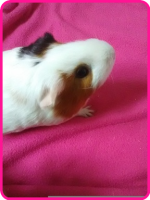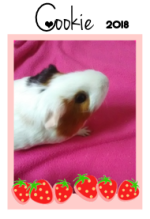Some things that are different to guinea pigs than cats and dogs on a very base level are their digestive systems and teeth.
Guinea pigs are unable to vomit, and constantly secrete stomach acid (thus must have food constantly moving through their systems, a guinea pig that is not eating can experience life threatening complications very quickly, the lack of ability to vomit also means they don't have to fast before surgery beyond giving enough time so they don't have anything in their mouths when they go under).
They digest all their food twice, they have cecal poops which are half digested and are re-eaten - you almost never see these as they bend over and eat them as they do them. They don't produce their own vitamin C so need it in their diet.
Basic care tips when it comes to food are they should have an unlimited supply of grass hay that they have access to 24/7 (unlimited in the sense it is always topped up before it runs out), 1 cup of vegetables per guinea pig per day (bell peppers are good for getting them their vitamin C), and 1/8 cup of high quality pellets per guinea pig per day (oxbow is generally the recommended brand for both quality and availability).
Bladder stones are a relatively common health complication, thus high calcium foods should be avoided in adult guinea pigs who are not pregnant or lactating. They also have teeth that are constantly growing (grass hay is what keep these ground down, thanks to the silica content of hay and the grinding motion of chewing).
Guinea pigs are also sensitive to some medications that dogs and cats aren't. For example penicillin based drugs can cause lethal complications in guinea pigs (like GI stasis).
Guinea pigs being prey animals are very good at hiding symptoms of illness, weighing them weekly and recording it is a good habit to form as often the first sign that something is wrong will be sudden drastic, or small but sustained, weight loss.
They also need large flat areas to be able to run, so small or small but multi level cages aren't suitable. The recommended size is 10 square feet on a single level, this size is suited to both a single guinea pig or a pair, but more space is always better so they can exercise on their schedule.
On the note of their scheduled, guinea pigs don't have a set sleep and awake period like we do. They instead take frequent naps (napping with their eyes open almost all the time). Guinea pigs are crepuscular animals so they are most active at dawn and dusk but in our homes they can be doing their thing at any hour of the day morning or night.
They do however like consistency whenever possible, having a good feeding schedule helps cut down on unwanted noise. They run like clockwork, so if they know when food is coming they will week, if food can come at any time of the day so they don't know when to expect it you might find yourself with guinea pigs wheeking even in the middle of the night at the slightest hint of movement thinking that they could be getting food.
Guinea pigs are also herd animals so it is advised to house them with another of their own kind, but you do have to introduce them the right way as they will need to establish a hierarchy, see this link for more info about introducing guinea pigs
https://guinea-pigs.livejournal.com/3002707.html
If you would like to read more about both the basic care and medical care of guinea pigs I would suggest checking out these links:
https://www.guinealynx.info/healthycavy.html
https://www.guinealynx.info/medical_guide.html
https://www.guinealynx.info/medical.html
https://www.guinealynx.info/dangerous_medications.html

